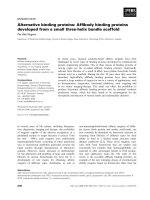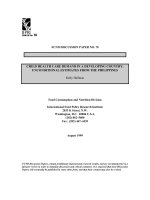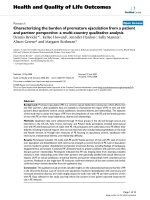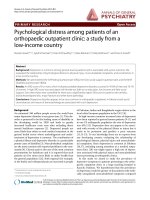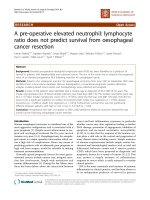Why Copying LIS from a Developed Country Does Not Work for a Developing Country?
Bạn đang xem bản rút gọn của tài liệu. Xem và tải ngay bản đầy đủ của tài liệu tại đây (37.02 KB, 2 trang )
TS 9 – Applied SIM and SDI
Trung Tran and Don Grant
TS9.6 Why Copying LIS from a Developed Country Does Not Work for a Developing Country?
From Pharaohs to Geoinformatics
FIG Working Week 2005 and GSDI-8
Cairo, Egypt April 16-21, 2005
1/16
Why Copying LIS from a Developed Country Does Not Work for a
Developing Country?
TRAN Nhu Trung, Vietnam and Don GRANT, Australia
Key words: land administration, land information systems, spatial data infrastructure and
digital cadastral data base.
SUMMARY
FIG and other international organizations have demonstrated that a land administration
system (LA) and its supporting tool–Land Information System (LIS)–play a key role in
sustainable socio-economic development of a country. This is because land, one of the major
objects of the system, continues to be scarce and therefore more valuable.
LA and LIS are very well established in many developed countries including the Netherlands,
Australia, Germany, Canada and Sweden. Many donors and funding organizations have
supported developing countries to build such systems. Developing countries are also eager to
have such systems. Projects, to implement and establish LIS, have often replicated systems
from developed countries.
The authors of this paper have considered some aspects of the institutional arrangements,
legal conditions and user demands of a LIS as they relate to Vietnam. They believe that the
distinctive characteristics of this developing country, which create the failure of copying, are
identified as:
−
LIS in Vietnam requires a multi-faceted (theme and resolution) spatial data
infrastructure, which is different from a parcel based system (single-solution) of LIS in
many developed countries. The spatial data infrastructure allows for capture,
maintenance and use of data for different themes for different management levels of
nation, province, district and commune
1
.
−
LIS in Vietnam is not only a tool for land registration and the land market but also a land
policy monitoring system for the next re-adjustment and modification to achieve the
societal goals of poverty reduction, environmental protection and sustainable socio-
economic development.
A developing country, due to its institutional arrangements and the interplay with a range of
social structures, has a greater need to gain a holistic view of the landscape with its economic
1
National Spatial Data Infrastructures are not new and many developed countries claim that they have one.
However in practice there are very few holistic NSDIs in existence. At best there is usually a limited parcel
based graphical system providing for a number of themes with little institutional coordination, spatial
compatibility or operational integration. There are exceptions.
TS 9 – Applied SIM and SDI
Trung Tran and Don Grant
TS9.6 Why Copying LIS from a Developed Country Does Not Work for a Developing Country?
From Pharaohs to Geoinformatics
FIG Working Week 2005 and GSDI-8
Cairo, Egypt April 16-21, 2005
2/16
and social implications. The LIS suitable for developing countries must be capable of
providing a sound base for economic and environmental planning. This is certainly the theory
in developed countries but there is little evidence that it is so in practice. Accordingly
developing countries may require a more complex approach to an LIS than the relatively
simple use of the LIS in many developed countries.
SUMMARY (Vietnamese)
FIG và các tổ chức quốc tế khác đã chứng tỏ rằng Địa chính (LA) và công cụ của nó - Hệ
thống thông tin đất đai (LIS) - đóng một vai trò quan trọng trong phát triển kinh tế xã hội bền
vững của một đất nước. Điều này là do đất đai, một trong những nội dung chính của hệ thống,
càng ngày càng trở nên khan hiếm và có giá trị.
LA và LIS đã được thiết lập rất có hiệu quả ở các nước phát triển như Hà Lan, Úc, Đức, Can
Na Đa và Thuỵ Điển Nhiều nhà tài trợ và các tổ chức tài chính đã hỗ trợ các nước đang phát
triển xây dựng các hệ thống như vậy. Các nước đang phát triển cũng rất mong muốn có được
một hệ thống tương tự. Các dự án này phát triển hệ thống LIS nêu trên, thông thường là sao
chép lại các hệ thống từ các nước phát triển.
Các tác giả của bài báo này lại quan tâm một số khía cạnh về thể chế, cơ sở pháp lý cũng như
nhu cầu sử dụng của LIS khi triển khai ở Việt Nam. Họ tin rằng những điều kiện đặc biệt này
của nước đang phát triển sẽ làm cho việc sao chép nói trên không thực hiện được với các lý
do sau:
−
LIS ở Việt Nam là một hệ thống đa cạnh (về thông tin thuộc tính lẫn độ phân giải không
gian). Điều này hoàn toàn khác biệt với LIS ở các nước phát triển là một hệ thống đơn
cạnh dựa trên cở sở đơn vị thửa đất. Nó đòi hỏi một hệ thống cơ sở hạ tầng thông tin
không gian cho phép thu thập, quản lý và sử dụng dữ liệu cho nhiều cấp quản lý nhà
nước, như trung ương, tỉnh, huyện và xã.
−
LIS ở Việt Nam không chỉ là một công cụ sử dụng cho mục đích đăng ký đất đai trong
thị trường đất mà còn là hệ thống giám sát chính sách cho các lần sửa đổi sau này để đạt
được các mục tiêu xã hội như xoá đói giảm nghèo, bảo vệ môi trường và phát triển bền
vững.
Ở một nước đang phát triển, do hệ thống thể chế cũng như sự đan xen giữa các cấu trúc xã
hội nên cần hơn hết một cách nhìn toàn cảnh, chính xác các tác động của kinh tế xã hội lên
phát triển LIS. Do đó hệ thống LIS cho các nước đang phát triển cần phải có khả năng cung
cấp số liệu cơ bản cho việc xây dựng kế hoạch phát triển kinh tế và bảo vệ môi trường. Đây
thực sự là một nội dung lý thuyết ở các nước phát triển nhưng chưa có bằng chứng cụ thể nào
cho sự hoạt động của nó trong thực tế. Có lẽ và do đó, các nước đang phát triển yêu cầu một
cách phát triển LIS phức tạp hơn cách thức đơn giản hiện nay đang áp dụng ở các nước phát
triển.




